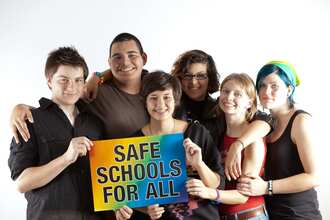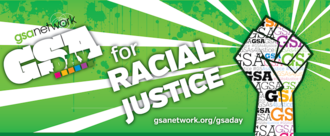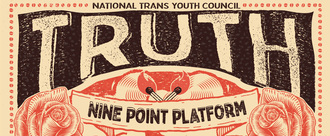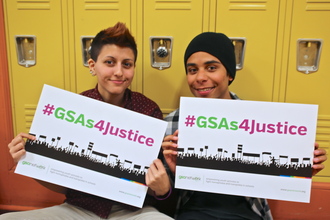- Featured
- Academics
- Accessibility
- Anti-Trans Legislation (State/Federal)
- Art & Mural Projects
- Black Lives Matter in Schools
- Bodily Autonomy
- Book Bans & Curriculum Censorship
- Bullying & Harassment
- Climate Justice
- Community GSA Formation
- Culturally Responsive Curriculum
- Discipline & Surveillance Policies
- Dress Code Reform
- Events & Celebrations
- Free Palestine / Anti-Occupation Solidarity
- Immigration Justice / Abolish ICE
- Inclusive Sex-Ed
- Indigenous Sovereignty & Land Back
- Language Justice/ Multilingual Access
- LGBTQ-Inclusive Curriculum
- Mental Health Access
- Police Free Schools
- Restroom & Locker Room Access
- School Budgets & Resource Allocation
- School Clubs (GSAs, Affinity Spaces)
- Student Loan & College Access Reform
- Student Media & Free Expression
- Substance Free/Harm Free Zones
- Teacher & Staff Accountability
- Transgender Youth Rights
- Visibility & Pride/GSA Days
- Voting Rights & Youth Civic Power
- Youth Labor & Economic Justice
- Youth Leadership & Decision Making
- More
-
We need a GSA at Coldwater High School!Coldwater is a time capsule into the mid 70s, and I want to help change that and bring students to the 21st century and make our school a safer place. I was in a GSA in my old school and with it there was a place for me to be free of all my worries and a place for me to help others now I don't have that freedom and place that I can help others. A Genders & Sexualities Alliance club, or GSA, would provide a much-needed safe place for students to meet, support each other, talk about issues related to sexual orientation and gender identity, and work to create positive change on campus. Under the Federal Equal Access Act (http://www.gsanetwork.org/federal-equal-access-act), any school that receives government funding and has at least one other non-curricular club is legally required to also allow a GSA. Legally, public schools with other clubs must let students start a GSA -- and must treat the GSA like any other student club! Schools can't make up rules that only apply to the GSA and nobody else. GSAs have been proven to make schools safer for all students. Allow us to start a GSA so that ALL students can succeed.14 of 100 SignaturesCreated by Jason S.
-
What We Deserve: How schools can support trans and queer youth of colorWE DESERVE 1) Public school systems that have funding regardless of local property tax or proximity to wealthy, white communities. 2) Police-free schools without armed guards or armed teachers. 3) Schools with GSAs (or other student-led convening spaces). 4) Administrators and Teachers who are POC, trans and queer. 5) Administrators, Teachers and Staff with annual Racial and Gender competency training. 6) Black, Indigenous, Latinx, Asian, and LGBTQIA relevant curriculums with Fine Arts and Advanced Placement courses that reflect our diverse and ancient cultures. 7) Multiple full-time nurses and full-time social workers at our schools. 8) Schools with Trans and Queer Youth of Color Student Government Committees165 of 200 SignaturesCreated by National Youth Council o.

-
Sign onto the National Trans Youth Council's Nine Point PlatformWe cannot break the chains that bind us if we do not strive for a world without the very systems that put them on our wrists. We cannot work alone towards this goal either, because no one struggles alone; the white, heterosexual and cisgender patriarchy harms all us. When LGBTQ+ youth come together, when the most marginalized of us are uplifted, and when those more privileged acknowledge and use it for the fight, our community has a voice that will not be silenced and the power to create a just world for all.155 of 200 SignaturesCreated by Juniperangelica Gia L.
-
Matawan Aberdeen Regional School DistrictIn November 2013, Jewlyes Gutierrez, a transgender girl from California, was outrageously charged with assault for defending herself against bullying at school. A year earlier, Dynasty Young in Indiana was expelled for bringing a stun gun to school in self-defense after enduring months of harassment based on his sexual orientation and gender expression. Jewlyes, Dynasty, LGBTQ youth, and all students deserve better. Our district can -- and must -- take action now to make sure our students are never put in a similar position. We often hear about bullying in schools, but the anti-bullying and zero tolerance policies adopted in response pose just as much of a danger for LGBTQ youth of color. Together, hostile school environments and extreme disciplinary policies create a school-to-prison pipeline for youth of color, youth with disabilities, and LGBTQ youth, telling them that their lives are disposable and that simply trying to get an education carries a risk of jail time. LGBTQ youth make up just 5-7% of the youth population, but represent 15% of those in the juvenile justice system. Exclusionary practices (like suspensions and expulsions) hurt all students' ability to succeed and achieve their academic goals and dreams. We believe restorative justice practices are the best solution for school discipline problems involving bias-based bullying and harassment, because they allow schools to address the root problems behind bullying and harmful behavior. In January, the Obama administration released guidelines for improving school climate and discipline. Those guidelines recommend best practices like restorative approaches and condemn punitive policies and court referrals. It has been proven that alternative discipline with non-punitive approaches provides better student outcomes and keeps the student community together. In March 2014, the National Education Association, the American Federation of Teachers, the Opportunity to Learn Campaign, and the Advancement Project jointly released a toolkit highlighting restorative approaches as a best practice and providing guidance to administrators and educators on implementing them. In order to keep ourselves and fellow students in school, we demand that restorative justice practices, as outlined in the "Restorative Practices: Fostering Healthy Relationships & Promoting Positive Discipline in Schools" toolkit, be implemented in our district.19 of 100 SignaturesCreated by Emilly H.
-
North Carolina Students Need Solutions: Adopt Restorative PracticesIn November 2013, Jewlyes Gutierrez, a transgender girl from California, was outrageously charged with assault for defending herself against bullying at school. A year earlier, Dynasty Young in Indiana was expelled for bringing a stun gun to school in self-defense after enduring months of harassment based on his sexual orientation and gender expression. Jewlyes, Dynasty, LGBTQ youth, and all students deserve better. Our district can -- and must -- take action now to make sure our students are never put in a similar position. We often hear about bullying in schools, but the anti-bullying and zero tolerance policies adopted in response pose just as much of a danger for LGBTQ youth of color. Together, hostile school environments and extreme disciplinary policies create a school-to-prison pipeline for youth of color, youth with disabilities, and LGBTQ youth, telling them that their lives are disposable and that simply trying to get an education carries a risk of jail time. LGBTQ youth make up just 5-7% of the youth population, but represent 15% of those in the juvenile justice system. Exclusionary practices (like suspensions and expulsions) hurt all students' ability to succeed and achieve their academic goals and dreams. We believe restorative justice practices are the best solution for school discipline problems involving bias-based bullying and harassment, because they allow schools to address the root problems behind bullying and harmful behavior. In January, the Obama administration released guidelines for improving school climate and discipline. Those guidelines recommend best practices like restorative approaches and condemn punitive policies and court referrals. It has been proven that alternative discipline with non-punitive approaches provides better student outcomes and keeps the student community together. In March 2014, the National Education Association, the American Federation of Teachers, the Opportunity to Learn Campaign, and the Advancement Project jointly released a toolkit highlighting restorative approaches as a best practice and providing guidance to administrators and educators on implementing them. In order to keep ourselves and fellow students in school, we demand that restorative justice practices, as outlined in the "Restorative Practices: Fostering Healthy Relationships & Promoting Positive Discipline in Schools" toolkit, be implemented in our district.9 of 100 SignaturesCreated by Christy B.
.png)




